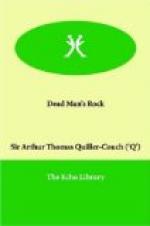In answer to my uncle’s apologetic hesitation the stranger merely spread out his palms and shrugged his shoulders.
“Ah, yes. A foreigner evidently. Well, well, although our coast is not precisely hospitable, I believe its inhabitants are at any rate free from that reproach. Jasper, my boy, can you walk now? If so, Joseph here will see you home, and we will do our best for the—the— foreign gentleman thus unceremoniously cast on our shores.”
My uncle seemed to regard magnificence of speech as the natural due of a foreigner: whether from some hazy conception of “foreign politeness,” or a hasty deduction that what was not the language of one part of the world must be that of another, I cannot say. At any rate, the fishermen regarded him approvingly as the one man who could—if human powers were equal to it—extricate them from the present deadlock.
“You do not happen, my friend, to be in a position to inform us whether any—pardon the expression—any corpses are now lying on the rocks to bear witness to this sad catastrophe?”
Again the stranger made a gesture of perplexity.
“Dear, dear! I forgot. Jasper, when you get home, read very carefully that passage about the Tower of Babel. Whatever the cause of that melancholy confusion, its reality is impressed upon us when we stand face to face with one whom I may perhaps be allowed to call, metaphorically, a dweller in Mesopotamia.”
As no one answered, my uncle took silence for consent, and called him so twice—to his own great satisfaction and the obvious awe of the fishermen.
“It is evident,” he continued, “that this gentleman (call him by what name you will) is in immediate need of food and raiment. If such, as I do not doubt, can be obtained at Polkimbra, our best course is to accompany him thither. I trust my proposition meets with his approval.”
It met, at any rate, with the approval of the fishermen, who translated Uncle Loveday’s speech into gestures. Being answered with a nod of the head and a few hasty foreign words, they began to lead the stranger away in their midst. As he turned to go, he glanced for the last time at me with a strange flickering smile, at which my heart grew sick. Uncle Loveday lingered behind to adjure Joe to be careful of me as we went up the cliff, and then, with a promise that he would run in to see mother later in the day, trotted after the rest. They passed out of sight through the archway of Dead Man’s Rock.
For a minute or so we plodded across the sand in silence. Joe Roscorla was Uncle Loveday’s “man,” a word in our parts connoting ability to look after a horse, a garden, a pig or two, or, indeed, anything that came in the way of being looked after. At the present moment I came in that way; consequently, after some time spent in reflective silence, Joe began to speak.
“You’m looking wisht.”
“Am I, Joe?”




